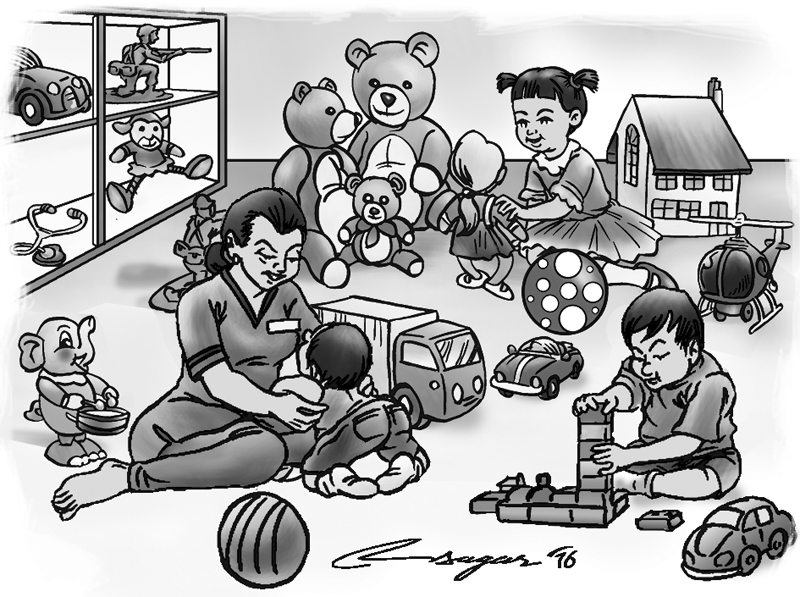Early childhood development: Importance of preschools
We have plenty of examples of our neighboring countries with successful preschool/ECD programs in countries of South East Asia like Thailand, Vietnam, and the Philippines which are very much similar to our context even in terms of culture
Preschools/ECD centers are playing good roles in shaping children for pre-primary education.
However, there are many challenges confronting the development of ECD in Nepal like setting goals and targets by government of Nepal for making ECD services available to children living in remote and rural areas, specially the marginalized groups.
Parent’s awareness rises as a major challenge, as only enrolling in preschool/ECD isn’t the complete solution.
Myself being a practitioner in a similar field, I have come across such situations many times. Parent education program has to be organized in a timely manner to highlight the awareness and importance of pre-schooling.
In modern context, the preschool has been a great help to women, specially working women in urban areas as the child is sent to preschools.
Working women can play the role of a mother and at the same time continue being independent through her work.
Myself being one of the working women I was able to complete my studies continuing to work because I could send my daughter to preschool. And we are very satisfied and happy with her. Pre-schooling challenges the concept of housewives providing opportunity for women to explore and continue either studies or work which makes them independent.
Preschool has lots of positive sides in a South Asian country like ours from helping a women to empower to creating opportunities.
As the philosophy of preschool (Montessori), the facilitator has to be a woman, on top of that priority is given to those who are married and have children and to become a preschool or ECD facilitator you need to be trained.
Though the ECD facilitators are trained, the different approaches adopted by different institutional schools do not give uniformity to the services provided by preschool/ECD centers.
The infrastructure in the context of child friendliness however stands as a challenge, as limited budget is allocated by the government of Nepal to community preschool/ECD centers.
But positive signs could be seen with the approach of government’s one year preschool program. Also, the initiation of Nepal government on improvement of the infrastructures is likely.
We can sense it when we visit the sishu kakshya of community schools where the classrooms are carpeted and low tables are kept giving a vibe of child friendliness.
The government of Nepal has set an ambitious target of enrolling 80% ECD experienced children at Grade-1 which shows that there is a lack of commitment.
Here, we can see that with the instigation of the government, we have positive inclinations and objectives that could be met if rigorous procedures are followed to achieve the set targets and goals.
The improvement of the quality of ECD centers and integrating the early child development programs in terms of remuneration to facilitators and capacity building being run by various organizations is among other challenges.
And, teacher development as it plays a vital role as teacher being the facilitator in the classroom should have the complete knowledge of pedagogy practices and skills required for a preschool/ECD facilitator.
With the increase in opening of schools there should be focus on teacher training as well.
The standardization regarding the infrastructure, curriculum, pedagogy and teachers could take the preschools to a different level.
However, there seems to be a monopoly in running the preschools in Nepal especially in case of Institutional Schools which bring variations in the pedagogy. The scenario could be different with proper monitoring and evaluation.
There should be uniformity in teaching practices in all the preschools of Nepal by developing standard procedures to monitor the quality of services provided by schools.
The education status could be taken to a different level through preschools as they prepare students for primary level.
We have plenty of examples of our neighboring countries with successful preschool/ECD programs in countries of South East Asia like Thailand, Vietnam, and the Philippines which are very much similar to our context even in terms of culture.
In these countries these programs seen as a progressive step towards education.
It requires the establishment of clear targets and objectives in relation to what the program is aiming to achieve. These aims and objectives need to be openly and regularly discussed with all involved in the program.
All the stakeholders such as parents and teachers must be regularly engaged in opportunities to shape, clarify and modify these objectives and to define outcomes which will ultimately help in achieving the desired goal.
Proper development of children is not possible at home, so preschools/ECD centers are necessary.
They learn values that are required for primary education.
Therefore, to incorporate preschool program as a formal part of school ensuring budgetary provisions, setting minimum standards, bringing uniformity in services in terms of preschool program components, management, curriculum, teaching pedagogy, teacher qualification, and remuneration, mainstreaming the preschool program is required.
Furthermore, preschools should ensure the access of vulnerable children through collaborative efforts in making policy decisions, political commitment considering the representation.






